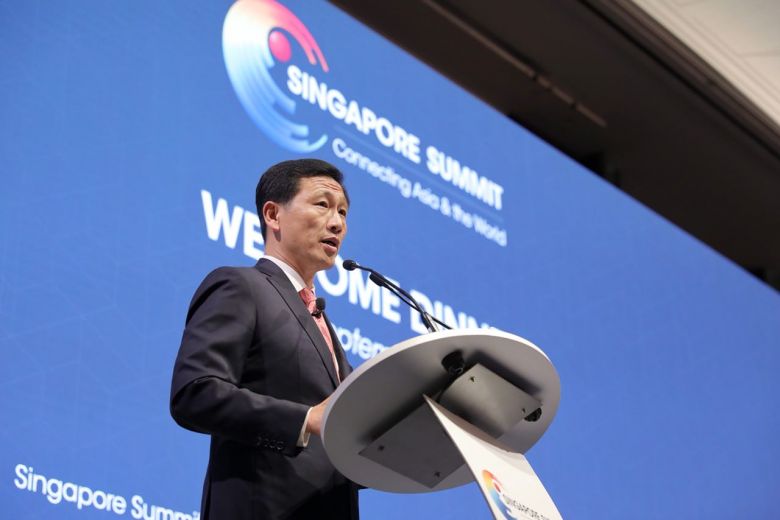Long-term decisions key to Singapore's survival: Ong Ye Kung
He lists 4 areas in which Govt is making them, including bringing about new era in education
Sign up now: Get ST's newsletters delivered to your inbox

At the Singapore Summit, Education Minister Ong Ye Kung outlined the Government's long-term strategies in four areas: Infrastructure, the economy, an ageing population and education.
ST PHOTO: GAVIN FOO
Even as politics elsewhere becomes more short-term and populist, Singapore will have to remain committed to taking long-term decisions if it is to survive as a small state, Education Minister Ong Ye Kung said yesterday.
He set out four areas in which it is doing so: Continuing to develop the country's infrastructure, finding new economic engines such as venturing out of Singapore, supporting the ageing population, and bringing about a "new era" in education that emphasises applied learning and cultivating creativity.
Speaking at the opening of the Singapore Summit, he said the business forum is taking place in "tumultuous times". "The tone is quite clear: The world is going to be fundamentally different - we need to understand and, more importantly, need to be able to respond to these trends," he said in his address to about 400 global business and thought leaders attending the two-day meeting.
In the coming decades, competition is less likely to be between countries, but more likely between cities, and Singapore needs to step up to remain at the forefront.
Singapore is doubling its airport and seaport capacities, and developing three business districts outside the Central Business District to better spread activities across the island - Woodlands in the north, Punggol in the north-east and Jurong in the west.
The Government has committed to upgrade homes every 30 years at highly subsidised rates, he said. When flats are around 70 years old, the Government will offer residents an option to buy their units and redevelop the entire estate.
"Housing is a core compact between the people and the Government," he said. "We will not allow an entire residential town to become old and rundown."
To grow the economy, Singapore needs to go beyond foreign direct investment, which has been a major part of Singapore's growth model.
"For our next phase of economic development, we must embrace innovation, develop new products and services, and nurture Singapore-based companies to venture out to the region, bring those products and services to the world and the region, and tap into the vast markets around us," said Mr Ong.
"So, from making things to creating things... this is a major shift in economic strategy," he said.
Mr Ong also said Singapore - which has free trade pacts with Asean, the United States, China and others - is investing in research and development as a priority. Other aspects of its value proposition include offering a conducive living environment and a well-regulated yet enterprise-friendly environment.
To tackle the challenge of an ageing population, the Government is introducing policies such as raising the retirement age and new legislation on re-employment to help people work longer if they wish.
Still, Singapore must ensure fiscal sustainability. To fund the expected rise in healthcare costs, the goods and services tax will be hiked from 7 per cent to 9 per cent after 2020.
Finally, Singapore is making changes to its education system.
With technological advancements and industry disruptions, learning is now a lifelong process, he said. Increasingly, it is "human skills", including soft skills, that carry a premium, he added.
In a panel discussion after his speech, Mr Ong discussed the role of fourth-generation leaders, of which he is one, in helping today's youth.
With the younger generation being more entrepreneurial, he hopes Singapore can be a "living laboratory" as well to test ideas that can also be implemented in other cities.
SEE TOP OF THE NEWS


